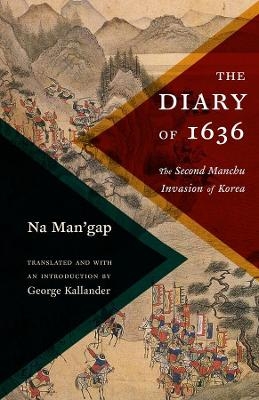
The Diary of 1636
Columbia University Press (Verlag)
978-0-231-19756-4 (ISBN)
Early in the seventeenth century, Northeast Asian politics hung in a delicate balance among the Chosŏn dynasty in Korea, the Ming in China, and the Manchu. When a Chosŏn faction realigned Korea with the Ming, the Manchu attacked in 1627 and again a decade later, shattering the Chosŏn-Ming alliance and forcing Korea to support the newly founded Qing dynasty.
The Korean scholar-official Na Man’gap (1592–1642) recorded the second Manchu invasion in his Diary of 1636, the only first-person account chronicling the dramatic Korean resistance to the attack. Partly composed as a narrative of quotidian events during the siege of Namhan Mountain Fortress, where Na sought refuge with the king and other officials, the diary recounts Korean opposition to Manchu and Mongol forces and the eventual surrender. Na describes military campaigns along the northern and western regions of the country, the capture of the royal family, and the Manchu treatment of prisoners, offering insights into debates about Confucian loyalty and the conduct of women that took place in the war’s aftermath. His work sheds light on such issues as Confucian statecraft, military decision making, and ethnic interpretations of identity in the seventeenth century. Translated from literary Chinese into English for the first time, the diary illuminates a traumatic moment for early modern Korean politics and society. George Kallander’s critical introduction and extensive annotations place The Diary of 1636 in its historical, political, and military context, highlighting the importance of this text for students and scholars of Chinese and East Asian as well as Korean history.
George Kallander is associate professor of history at the Maxwell School of Citizenship and Public Affairs at Syracuse University, where he is director of the East Asia Program at the Moynihan Institute of Global Affairs. He is the author of Salvation Through Dissent: Tonghak Heterodoxy and Early Modern Korea (2013).
Acknowledgments
Introduction
Dramatis Personae
Translator’s Note
Early Complications
Daily Records After Urgent Reports from the Frontier
Record of Loyalists Everywhere
Kanghwa Island Records
Records of Several People Who Rejected Peace Negotiations and Died of Righteousness
Miscellaneous Notes Concerning What Happened After the Upheaval
Record of Ch’ŏngŭm’s Slandering
Humiliation Received from the Qing
Glossary of Names, Terms, and Places
Notes
Bibliography
Index
| Erscheinungsdatum | 25.08.2020 |
|---|---|
| Reihe/Serie | Translations from the Asian Classics |
| Übersetzer | George Kallander |
| Zusatzinfo | 3 maps |
| Verlagsort | New York |
| Sprache | englisch |
| Maße | 140 x 216 mm |
| Themenwelt | Literatur ► Anthologien |
| Literatur ► Biografien / Erfahrungsberichte | |
| Literatur ► Briefe / Tagebücher | |
| Sachbuch/Ratgeber ► Geschichte / Politik | |
| Geisteswissenschaften ► Geschichte ► Regional- / Ländergeschichte | |
| ISBN-10 | 0-231-19756-X / 023119756X |
| ISBN-13 | 978-0-231-19756-4 / 9780231197564 |
| Zustand | Neuware |
| Haben Sie eine Frage zum Produkt? |
aus dem Bereich


